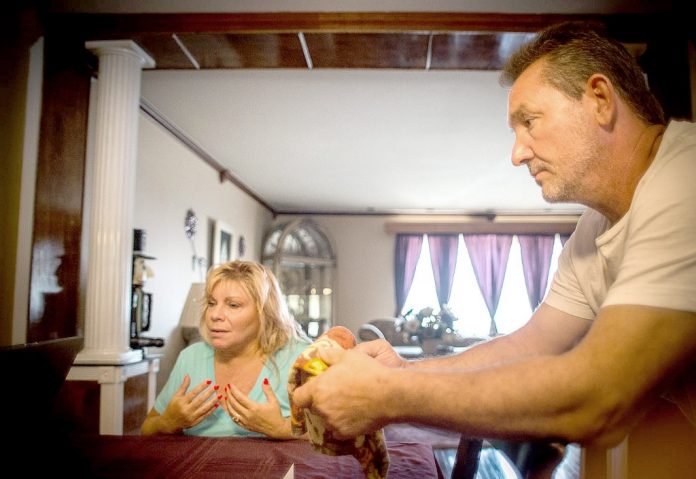Filing suit: Christos and Markela Sourovelis claim the Philly DA’s Public Nuisance Task Force is overaggressive in taking properties, and because the money raised by forfeiture goes into the salaries of the people who run the program, there is a conflict of interest built in.
A Northeast couple has been trying to keep their Somerton home from becoming the District Attorney’s office’s property. Christos and Markela Sourovelis said representatives of the DA’s office forced them out of their Ferndale Street home in early May, telling the couple that the office will take the property from them because of their son’s March drug arrest.
That process of taking the couple’s home is called forfeiture.
Last week, Christos and Markela joined two other plaintiffs who filed a federal class action suit, seeking to have the city’s forfeiture program declared unconstitutional. In their suit, they claimed the Philly DA’s Public Nuisance Task Force is overaggressive in taking properties and, because, the money raised by forfeiture goes into the salaries of the people who run the program, there is a conflict of interest built in.
The Sourovelises say they are being victimized by local enforcement of state forfeiture laws that were set up to deny illegal drug sellers the cash, cars and real property they used to commit their crimes. They essentially were being run over by an anti-crime program, they said, and insisted they’re not criminals.
The idea behind forfeiture, according to a news release from the District Attorney’s office, is to combat illegal drug use and that some properties become neighborhood nuisances when they are used for drug distribution.
The Public Nuisance Task Force, which initiates forfeiture in Philly, wrote DA’s spokeswoman Tasha Jamerson, “works directly with citizens, the police, government agencies, and community groups in an effort to abate or close drug properties (both residential and commercial.)”
In an Aug. 15 interview in their home, the Sourovelises said they’re not drug dealers and have never been charged with having anything to do with narcotics. They said they are a middle-class working couple whose son sold heroin worth $40 to a snitch outside their home. Instead of arresting this adult son when and where he made the sale, Christos complained, police waited a day and arrested him in their home.
“Why not arrest him when they see him do this?” he asked.
Instead, Markela said, the family got a terrifying visit from the cops on March 27 after Christos had left for work. She said police started banging on their door, stuck a gun in the door and threatened to shoot her barking pet pit bull if she didn’t put it out of sight and open the door.
Cops came in, took her son into custody, looked through the house and threatened to arrest her, she said. Meanwhile, a neighbor called Christos at his job, telling him police were at his house. Christos said he called his wife more than 100 times while he drove the 90 minutes from his job to his house, but she never answered. His wife said police took her phone from her and wouldn’t let her make calls or answer it.
“I get home and find my wife crying,” he said. “It was a mess.”
BATTLING THE DA
Their son entered into a diversionary court program, the Sourovelises said, and went into a drug rehab program. A day after that ended in early May, the couple said, they got a visit from representatives of the District Attorney’s office who said their home was being taken from them.
They were forced out for a week, they said, and lived at another son’s home. They went to City Hall, where they said an assistant district attorney from the DA’s Public Nuisance Task Force told them they could go back into their house only if they agreed to keep their son out of it.
Not represented by a lawyer at the time, they agreed, but the request perplexed them.
“Why can’t he be here so we can take care of him?” Christos asked. He said he and his wife asked where their son would live if not with them. They said they were told that’s not the DA’s problem.
Their son now lives with one of the couple’s other children.
On one of their trips to City Hall’s Room 478 to find out how they can keep their property, the couple met a representative of the Institute for Justice, a Virginia-based nonprofit that has an interest in forfeiture laws. Markela said the institute got them a lawyer to represent them pro bono to help them keep their home.
They also joined the suit filed Aug. 12 in federal court to stop Philadelphia’s whole forfeiture process. Why? Christos said he didn’t do anything and, if the DA’s office could take his house, it could take anybody’s.
It’s all so terrifying, Markela said. “You’re scared; you don’t know what’s going on … You have hanging over your head that somebody is going to take your house away.”
According to a press release from the Institute for Justice, civil forfeiture brings in revenue equal to almost 20 percent of the DA’s annual budget and the city spends almost 40 percent of the money forfeiture brings in on salaries, including the salaries of the “very police and prosecutors doing the seizing.”
The institute stated civil forfeiture brings in more than $6 million annually, twice as much as the revenue generated by Brooklyn, N.Y., and Los Angeles County, Calif., combined.
“Philadelphia’s system of robo-forfeitures and kangaroo courts pads the District Attorney’s budget with millions of dollars of unaccountable funds by stripping innocent residents of their rights and property,” said Darpana Sheth, the institute’s lead counsel on the case.
The Sourovelises are just one example of thousands each year who get ensnared by forfeiture in Philly, the institute stated in its Aug. 12 press release.
Philadelphians Doila Welch and Norys Hernandez also are battling forfeiture and are parties in the suit.
In a phone interview last week, Sheth said the institute became interested in Philadelphia’s forfeiture program after reading a story about it in the City Paper.
“Philadelphia really is the ground zero for forfeiture,” Sheth said.
CLASS ACTION
The class action suit, Sheth said, is filed on behalf of all the property owners who are involved in forfeiture in Philly - — or might be in the future.
Monetary damages are not being sought. “We want the city to stop what they’re doing,” she said.
Sheth said she wants a federal court to declare forfeiture unconstitutional. She said it runs contrary to the U.S. Constitution’s 14th Amendment’s due process clause. Sheth said the institute has intervened in other forfeiture cases around the country, but this is the first time it has tried to get a forfeiture program declared unconstitutional.
Jamerson said the District Attorney’s office wouldn’t comment directly on the suit. However, she said the Public Nuisance Task Force does not always pursue forfeiture “because the underlying issue with the real estate is resolved when a settlement agreement is reached with the property owner in which he or she agrees to take reasonable efforts to prevent future narcotics dealing from the property.”
In an August 2009 Northeast Times story on the task force, its head and defense attorneys said a property owner’s best defense in a forfeiture case is proving he or she knew nothing about drug dealing.
“Every case is evaluated in its own set of circumstances,” Assistant District Attorney Beth Grossman said in 2009.
That same year, attorney Mark Greenberg told the Times that the burden is on the owner of the property seized to prove that it is not connected to drug activity. Often, he said, that’s not a simple determination. Attorney William Brennan said the task force’s attorneys are tough, but will negotiate.
Settlements, Grossman said in 2009, depend “on the level of threat to the neighborhood.” ••

Home sweet home?: Christos and Markela Sourovelis filed a federal class action suit, seeking to have the city’s forfeiture program declared unconstitutional. They said the District Attorney’s office forced them out of their Ferndale Street home as a result of their son selling heroin worth $40. MARIA POUCHNIKOVA / TIMES PHOTOS





